Why are Startups Failing in India?
Context:
Indian startups are facing challenging times, with 2,404 of them shutting down in the Financial Year 2022 alone, according to data from Tracxn. Even in terms of funding received in 2023 was 5 year lowest with only $7 billion in 2023, down 73% from 2022.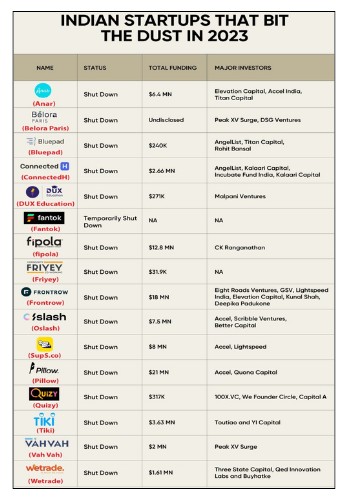
1.
What is the meaning of Startup companies & how are these different from other companies?
The term startup refers to a company in the first stages of operations. As per DPIIT, an entity can be identified as a startup if:
- Type: The Startup should be incorporated as a private limited company or registered as a partnership firm or a limited liability partnership.
- Turnover :Turnover should be less than INR 100 Crores in any of the previous financial years
- Time: An entity shall be considered as a startup up to 10 years from the date of its incorporation
- Purpose: The Startup should be working towards innovation/ improvement of existing products, services and processes and should have the potential to generate employment/ create wealth.
- Split or Reconstruct: An entity formed by splitting up or reconstruction of an existing business shall not be considered a Startup.
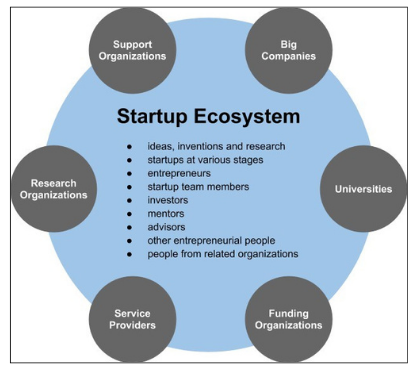
Following are the differences between Startups and Companies:
| Parameters | Startups | Companies |
|---|---|---|
| Registration | Directly with DPIIT | Through Companies Act, 2013 |
| Tax Benefit | Enjoy tax benefits such as Exemptions under Section 80 IAC of the Income Tax Act and Section 56 of the Income Tax Act (Angel Tax). | No such benefits are given to companies. |
| Business model | A startup is centered on an innovation that has never been brought to market before. This could be a product or service. | A company generally has an established solution to a known problem and has not developed anything particularly new. |
| Work Culture | More open and Flexible work culture. | More structured work culture. |
| Growth Approach | More aggressive as they try to Gain market share quickly | Moderate approach as they already have a foothold in the market |
| Risk | Startups are often willing to take on higher levels of risk in pursuit of growth and innovation | Companies are more riskaverse and focused on maintaining stability and profitability. |
| Funding | Startups often rely on external funding, such as venture capital or angel investment, to finance their growth and development | Companies are often funded through personal savings, bank loans, or other traditional financing sources. |
2.
Statistics of startup companies in India:-
- India has emerged as the 3rd largest country in terms of number of startups globally with over 1, 17,254+ DPIIT-recognized startups across the country as on 31st Dec 2023.
- India also ranked 3rd in the world in terms of number of Unicorns with 111+ unicorns of a total valuation of $ 350Bn+ as of Jan, 2023
- Indian Startup Ecosystem has seen exponential growth in past few years (2015-2022):
- 15X increase in the total funding of startups
- 9X increase in the number of investors
- 7X increase in the number of incubators.

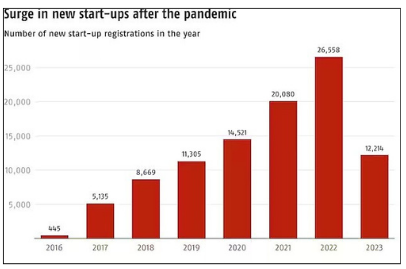
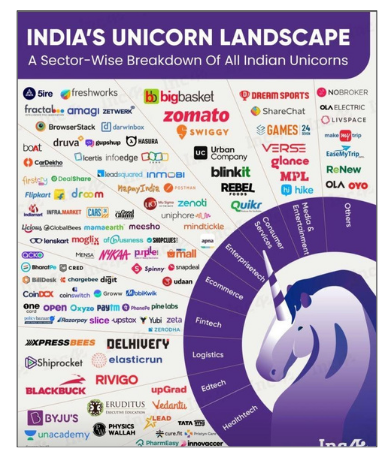
Declining trend of New Unicorns in the last 3 years in India:
| YEARS | UNICORNS IN INDIA |
|---|---|
|
2021 |
45 |
|
2022 |
23 |
|
2023 |
03 |
3.
What benefits are given to startups in taxation?
| Tax | Eligibility | Exemptions |
|---|---|---|
| Section 80 IAC of the Income Tax Ac |
|
|
| Section 56 of the Income Tax Act (Angel Tax) |
|
|
| Long-term Capital Gains Tax under new section 54EE |
|
|
| Tax exemption on investments above the fair market value |
|
|
| Tax Exemption Under Section 54GB |
|
|
4.
Which countries have the maximum number of startups and Unicorns?
There are more than 150 million Startups worldwide, of which a maximum are in the United States (77,927 startups). 1,361 startups globally hold the unicorn badge.
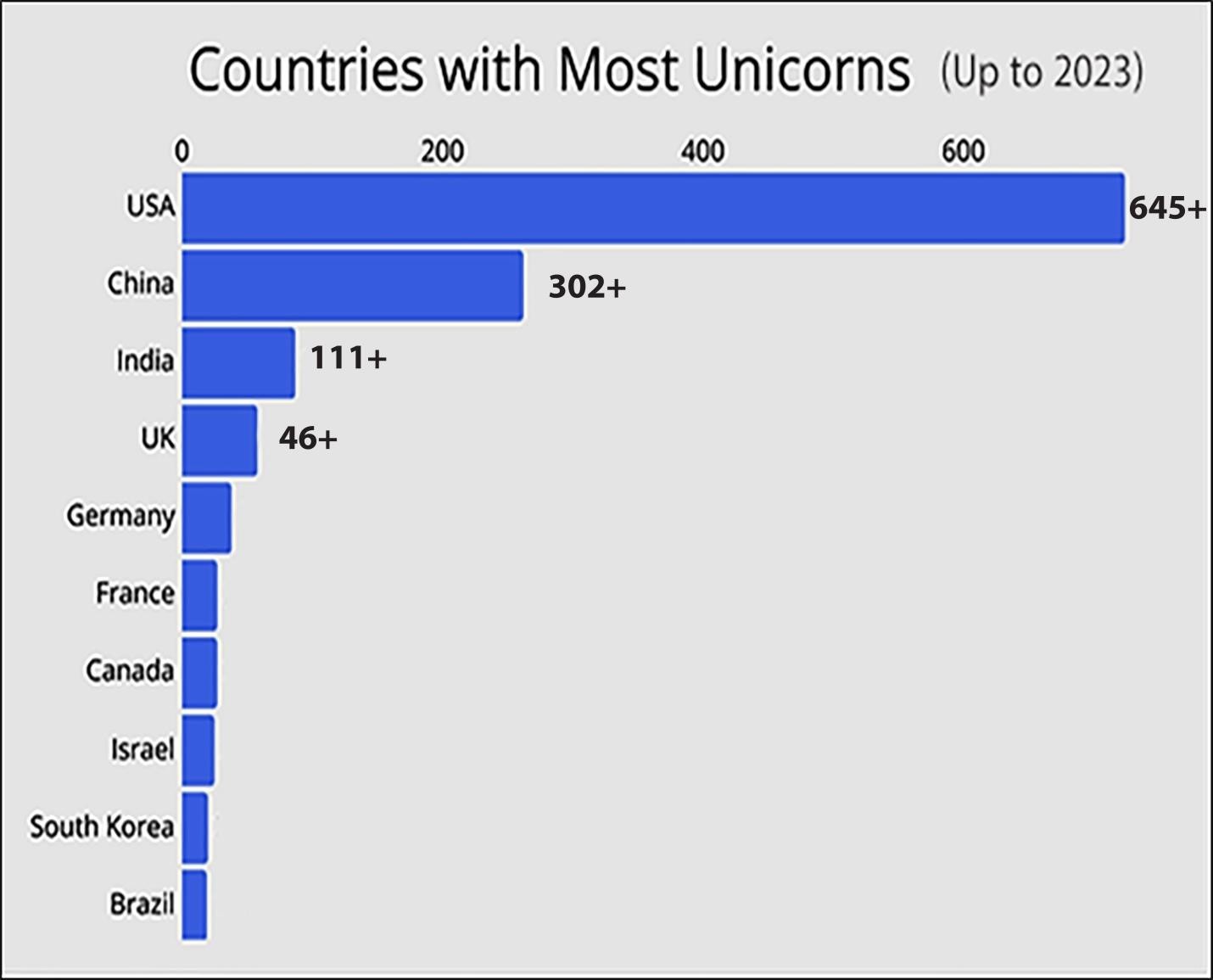
5.
What is startup funding & are there any specific guidelines for funding?
Funding refers to the money required to start and run a business. It is a financial investment in a company for product development, manufacturing, expansion, sales and marketing, office spaces, and inventory.
- Startup Must be Incorporated:
- Only incorporated entities are eligible to be recognized as Startups, and are therefore permitted to apply for Startup India Seed Funds.
- These include Private Limited Companies, One Person Companies, Limited Liability Partnerships, and Registered Partnership Firms.
- Startup Must be DPIIT-Recognized:
- To apply for Startup India Seed Fund, a Startup must be recognized by the DPIIT
- Startup Must Not be Older than 2 years:
- Seed Funds can be applied for only within 2 years from the date of a Startup’s incorporation. The objective of granting Startup India Seed fund is to support startups financially during the initial stages of operations.
- Startup Must Have an Idea and a Prototype Product:
- The allocation of Seed Funds are based on the concept and product prototype. So, startups must ensure that they atleast have their Proof of Concept and a sample product ready for testing
- Startups Must be Technology-Based:
- This is the most basic criteria for obtaining the Startup India Seed Funds. The concerned Startup must deal in innovative products, services or processes.
- Not received More Than Rs.10 lakhs as Government Grants:
- A startup which has already received more than Rs.10 Lakhs as funds from the Government before, it shall be ineligible for Startup India Seed Fund.
- Startup must have at least 51% Indian Shareholding:
- Foreign business entities are not eligible for Startup India Seed Fund. So, before applying for seed funds, make sure your startup has at least 51% Indian Shareholding.
- Startup Must Not be a Prior Receiver of Seed Fund:
- A Startup can receive seed funds in the form of grants, debts, and convertible debentures. However, each of these types can only be applied once.
6.
Why are startups failing in India? Is failure common in other companies? How to overcome these challenges?
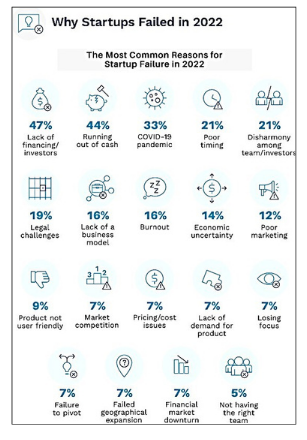
According to a study conducted by IBM Institute for Business Value– 91% of startups fail within the first five years. Some of the reasons are listed below:
Guidelines for Startups to apply for Startup India Seed Fund as per DPIIT are as follows:-
- Limited Resources:
- Startups often have limited financial resources, making it challenging to hire talent, invest in technology, or scale operations. Eg. TaxiForSure was a competitor of Ola and Uber could not raise funding and was ultimately acquired by Ola. HotelsAroundYou weren‟t capable of raising more money and had to shut down.
- Lack of innovation:
- Innovation is the most important factor in deciding the success or failure of Indian startups. Most startups failing in India lack adequate level of innovation and over dependence on foreign countries like China for manufacturing. Eg. PepperTap startup failed because of poor innovation.
- Poor IPR:
- Between 2016-17 and 2022-23, only 11% of the total patent applications filed by startups were granted.
- Bad Business Model:
- Around 17% of startups fail due to a lack of a clear business model.
- Having a well-defined business model is crucial for startups to generate revenue and achieve sustainable growth. Eg. Zoomo was a Bengaluru-based startup that wanted to build a trusted marketplace for used cars in India. The buy-and-sell vehicle market was relatively young in India and therefore startup failed.
- Competition:
- Startups often face intense competition from both established companies and other startups. Eg. Dazo, a food tech startup failed due to competition.
- Product Development Challenges:
- Developing a viable product or service that meets customer needs and stands out in the market can be challenging. Eg. SchoolGennie failed due to product market misfit.
- Founder/Team Dynamics:
- Disagreements, lack of alignment, or interpersonal conflicts can hinder progress and morale, making it essential to cultivate a positive and collaborative culture.
- According to Noam Wasserman, author of The Founder's Dilemmas, 65% of startups fail because of founder conflict.
- Uncertain Regulatory Environment:
- Startups often operate in industries that are subject to complex and evolving regulations.
- Navigating this regulatory landscape can be challenging and costly, requiring legal expertise and compliance efforts.
- According to PRS, 42 ministries / departments / bodies are overseeing the implementation of various schemes and initiatives related to startups.
- There are as many as 1,536 laws that directly or indirectly govern doing business in India leading to issues of Regulatory Cholesterol.
- Low Agri startups:
- Only 5% of the total startups are recognised under the agriculture sector. This field has enormous untapped potential for startups.
- Talent Acquisition and Retention:
- Recruiting and retaining top talent can be a significant challenge for startups, especially when competing with larger companies that offer higher salaries and more comprehensive benefits.
While 90% of Startups fail, the survival rate of companies is much better than the former.
Reason for success of companies are listed below:
- Passionate leadership and vision:
- Success of a company lies in its leadership and their vision.A welldefined vision is a skill or gift that every company leader needs in order to cross the finish line.
- Good management team:
- Managers are the people in place who take the established strategy and delegate tasks to the right team members to get it done. Good management will make or break a company
- Unique value:
- A successful business knows what it offers its customer base. New businesses that turn into successful companies are able to differentiate themselves by adding a unique value to their customers‟ lives.
- Good market fit:
- Beyond providing customers with a unique value, successful companies are able to find a good fit for their business in the marketplace.
- Strong financial planning and good financial health:
- A successful company is efficient in managing its finances and able to operate very lean. Every angle should have its own budget assigned and unnecessary expenses are avoided.
To tackle various challenges faced by startups, here are a few solutions to make startups more sustainable.

FICCI Startup Reforms:
- The FICCI Start-up Committee actively advocates for policy reforms with a vision to further strengthen India's thriving start-up ecosystem.
- It comprises stalwarts from academia, industry, government and the wider start-up ecosystem; who bring their knowledge, expertise and experience to the table.
The Standing Committee on Commerce (Chair: Dr. Abhishek Manu Singhvi)
It submitted its report on „Ecosystem of Startups to Benefit India‟ on August 10, 2023.
Key recommendations of the Committee include:- Access to funding:
- It recommended that the DPIIT should conduct an assessment to identify areas that require additional funding.
- Startups may be encouraged to adopt best accounting practices.
- Single implementation agency:
- It recommended the creation of a single implementing body to oversee and manage the entire startup ecosystem.
- It also recommended creating a grievance redressal mechanism to address issues in real-time and provide solutions.
- Regulatory support:
- The Committee noted that easing regulatory/legal framework to facilitate direct overseas listing of unlisted Indian startups could give a boost to the ecosystem.
- It also recommended simplifying the registration process for startups along with eliminating the extensive list of eligibility criteria for registration with DPIIT.
- Income tax exemptions:
- Under the Income Tax Act, 1961, if the gross total income of startups includes profits and gains derived from businesses, such profits can be deducted while computing total income for three consecutive years.
- The Committee noted that since the provision was implemented in 2017, only 10% of startups had applied for the exemption.
- In addition, only 1% of recognised startups have received the certificate of eligibility from the inter-ministerial board which is one of the conditions for claiming the exemption.
- The Committee recommended relaxing the criteria for issuing the eligibility certificate.
- Angel Tax:
- As per the Income Tax Act, 1961, an „Angel Tax‟ is levied on startups when they receive investments in excess of their fair market value.
- The Committee recommended that DPIIT should engage with stakeholders to address residual concerns regarding Angel Tax provisions.
- Agri startups:
- The largest segment of Indian startups is dedicated to information technology services.
- However, only 5% of the total startups are recognised under the agriculture sector.
- The Committee recommended that agri-based startups should be supported by providing increased funding opportunities and mentorship.
- Testing and certification:
- It recommended establishing dynamic testing and certification standards in line with international best practices.
- Intellectual property (IP) rights:
- Between 2016-17 and 2022-23, only 11% of the total patent applications filed by startups were granted.
- The Committee recommended that DPIIT should investigate the reasons for the low number of patents granted.
- It recommended conducting workshops to raise awareness among startups regarding IP laws and associated processes.
7.
What are sources of Funding in Indian startups ?
Funding refers to the money required to start and run a business. It is a financial investment in a company for product development, manufacturing, expansion, sales and marketing, office spaces, and inventory. Given below are some sources of startup funding as per StartupIndia initiative:-
- Bootstrapping/Self-financing:
- Bootstrapping a startup means growing the business with little or no venture capital or outside investment. It means relying on your savings and revenue to operate and expand.
- Friends & Family
- This is also a commonly utilized channel of funding by entrepreneurs still in the early stages.
- Business Plan/Pitching Events
- This is the prize money/grants/financial benefits that are provided by institutes or organizations that conduct business plan competitions and challenges. Even though the quantum of money is not generally large, it is usually enough at the idea stage. Ex Shark Tank.
- Incubators:
- Incubators are organizations set up with the specific goal of assisting entrepreneurs with building and launching their startups. Incubators also provide a lot of value-added services (office space, utilities, admin & legal assistance, etc.) along with grants/debt/equity investments. Eg. Y Combinator.
- Government Loan Schemes
- The government has initiated a few loan schemes to provide collateralfree debt to aspiring entrepreneurs and help them gain access to lowcost capital such as the Startup India Seed Fund Scheme and SIDBI Fund of Funds.
- Angel Investors
- Angel investors are individuals who invest their money into highpotential startups in return for equity. Ex- Indian Angel Network, Mumbai Angels, Lead Angels, Chennai Angels.
- Crowdfunding
- Crowdfunding refers to raising money from a large number of people who each contribute a relatively small amount. This is typically done via online crowdfunding platforms. Eg. Kickstarter.
- Venture Capital Funds
- Venture capital (VC) funds are professionally managed investment funds that invest exclusively in high-growth startups. VCs take startup equity in return for their investments and actively engage in the mentorship of their investee startups. Eg. Sequoia Capital.
- Banks/Non-Banking Financial Companies (NBFCs)
- Formal debt can be raised from banks and NBFCs at this stage as the startup can show market traction and revenue to validate its ability to finance interest payment obligations. This is especially applicable for working capital.
- Private Equity/Investment Firms
- Private equity and investment firms generally provide funds for fastgrowing late-stage startups who have maintained a consistent growth record.
- Initial Public Offering (IPO)
- IPO refers to the event where a startup lists on the stock market for the first time. It is generally undertaken by startups with an impressive track record of profits and who are growing at a steady pace.
8.
Historical perspective of startups?
- The origins of startups can be traced back to the United States in the 18th and 19th centuries. The first recorded use of the word "startup" was in a newspaper article in 1851 to describe a new business or enterprise.
- The concept of a startup began to take shape in the early 20th century. In the 1920s and 1930s, a number of new businesses were founded in the US that were typically small and focused on innovation
- The modern startup ecosystem began to take shape in the 1970s and 1980s in a period of economic turmoil, with high inflation and interest rates. However, it was also a time of great opportunity.
- A number of important startups were founded during this period, including Apple, Microsoft, and Genentech. The success of these companies inspired others to start their own businesses.
- In India in 1968, corporate giant, Tata Group, set up Tata Consultancy Services and took on several computerization-related projects in India. It partnered with a U.S based mainframe manufacturing company and began the era of offshoring.
- In the 1980s, a handful of pioneer IT service companies such as Infosys and Wipro placed India firmly on the global map. These companies invested in technology and leveraged the country‟s young workforce to provide cost-effective technology services to clients across the globe.
9.
What is the Impact of failure of startups in India, specifically employment?
Impact on Economy
Economic Ripples:- This rise of start-ups has demonstrated the ability to contribute roughly 4- 5% of India's GDP, contributing to India's $5 trillion economy vision.
- However, with startup failure it affects the economy at large.
- In addition to the initial costs of startup, there are often additional costs associated with closing up shop and winding down operations.
- Paytm crash wiped off ₹1.17 lakh crore of investors' wealth in 27 months (stock price went from 1780 rupees to 427 rupees).
Impact on Employment
Job Losses:- The Indian startup job market is in a state of alarm, witnessing a continuous decline in funding, leading to significant job disruption.
- Starting from 2022's funding winter, an estimated 20,000 employees have faced job losses in around 70 to 100 Indian startups.
- Byju‟s made the decision to remove approximately 500 - 1000 additional positions in the third round of layoffs this year, bringing a total number of job cuts to 4000 for the year.
- Gig Economy has a direct correlation with startups.As when startups rise , it promotes gig economy and on the other hand when start up fails it again ends up into gig economy.
- The gig economy in India is experiencing exponential growth, with a rising number of gig workers contributing significantly to the workforce.
- This trend is indicative of the evolving employment landscape in the country.
- According to the NITI Aayog report, about 47% of the gig work is in medium-skilled jobs, about 22% in high-skilled jobs, and about 31% in low-skilled jobs.
Other Impacts
Emotional Toll:- Startup failure can be emotionally devastating for founders and employees who have poured their time, energy, and passion into the venture.
- Lucky Gupta Agarwal creator of KQingdom, the social networking app commit suicide,because of the mismatch between his start-up expectation and reality.
- When startups fail, investors may become more cautious about funding new ventures, particularly in the same industry or with similar business models.
- This can make it harder for other entrepreneurs to secure funding for their own ventures, creating a ripple effect across the startup ecosystem.
- Startup failure can result in the loss of opportunities for innovation and economic growth.
- Promising ideas and technologies may never reach their full potential due to lack of resources or market acceptance.
10.
What Lessons can be learnt from startup Failures ?
NASSCOM an Indian non-governmental trade association has highlighted critical lessons to learn from failed Indian startups:-
- Innovation:
- Innovation is key to the success and sustenance of Indian startups.
- Startups need to leverage tech talent, positive government initiatives and the growing pool of ecosystem enablers and mentors to innovate and solve for India and make India a leader rather than a follower.
- Newer avenues in business models:
- Business and revenue models make or break startups and therefore they need to focus as much on these as their ideas and their products.
- Market Fit:
- One of the most crucial lessons is the importance of validating the product-market fit as early as possible. Copying solutions and models from successful startups/ businesses abroad will eventually lead to startup failure, if they are not customized to the Indian market and business context.
- Market Research:
- A product should never be launched without adequate, sound and objective market research. Overestimation of market needs or underestimation of competitors will only prove detrimental to the startup.
- Pivoting at the right time:
- Startups must be willing to pivot at the right time so as to evolve and sustain themselves in the dynamic business and market environment.
- Nokia is a great example of a company that didn‟t pivot soon enough. The Finnish company was the world‟s leading mobile phone manufacturer in the 2000s. But it failed to see the rise of smartphones and lost its dominant market position.
- Build A Viable Business Model:
- A perfect example of failure due to a great value proposition but a faulty business model is the case of Quibi.
- The mobile-oriented streaming service was shut down just six months after it launched because it developed its business model around a subscription service of short-length content, which people were already getting on YouTube, TikTok, etc.
- Keep An Eye On The Competition:
- Facebook did this when Google introduced Google Plus. They quickly responded with their own version, Facebook Groups, which helped them keep their dominant position.
11.
Why India is one of the few leading startup Countries? What are favorable features?
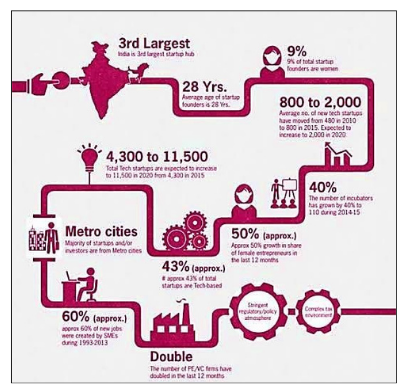
India is ranked third in the world in terms of number of Startups and Unicorns. As of Jan, 2024, India is home to 111+ unicorns with a total valuation of $ 350 Bn+.
Reasons for Startup growth in India are as follows:-
Market Potential:- India's massive population presents a significant market opportunity for startups.
- Nearly 70% of India's GDP is driven by domestic private consumption. The country remains the world's sixth-largest consumer market.
- Enterprises are realizing the disruptive potential of start-ups and are thus investing in them. Example
- Facebook in partnership with Startup India disbursed cash grants of $50,000 each to the top 5 selected startups.
- 10000 Women program by Goldman Sachs is providing women entrepreneurs all around the world with a business and management education, mentoring and networking and access to capital.
- India‟s vast and diverse market presents an unparalleled opportunity for startups.
- The rapid expansion of the middle class has resulted in a significant consumer base with disposable income.
- According to the “State of Indian Startup Ecosystem Report 2022,” India‟s ecosystem is thriving, with an anticipated 250+ unicorns by 2025, second only to the US.
- This influx of investment from venture capital firms demonstrates the confidence in India‟s entrepreneurial potential
- India has witnessed significant technological advancements in recent years, particularly in areas such as artificial intelligence, blockchain, machine learning, and cloud computing.
- The emergence of incubators and accelerators has provided startups with crucial support, mentorship, and resource access.
- Shark Tank India has inspired a wave of entrepreneurial enthusiasm across India.
- The show's viewership of over 100 million has exposed millions to the world of startups, igniting a desire to pursue their ventures.
- Major startup hubs such as Bengaluru (Silicon Valley), Hyderabad (Cyberabad), Pune, DelhiNCR provide a conducive entrepreneurial environment.
- Indian startups have gained global recognition, attracting attention from international investors, accelerators, and corporations.
- In India, Bangalore has been receiving increased global recognition as a tech start-up hub; as of now, Bangalore is considered to be the home for the largest number of tech start-ups in the country and third largest in the world
- India's online shopper base is estimated to increase to 400–450 million by 2027. 50 million new shoppers were added to the Indian e-retail market, which is ~35% growth over the online shopper base in 2020.
Government support:
1. Start Up India Scheme:- The Startup India initiative was launched by the Government on 16th January 2016 to build a strong ecosystem for nurturing innovation, startups and encouraging investments in the startup ecosystem of the country.
- Three flagship Schemes implemented under Startup India initiative:
- Startup India Seed Fund Scheme (SISFS):
- The Scheme aims to provide financial assistance to startups for proof of concept, prototype development, product trials, market entry and commercialization.
- Fund of Funds for Startups (FFS) Scheme:
- Under FFS, the Scheme does not directly invest in startups, instead provides capital to SEBI-registered Alternative Investment Funds (AIFs), known as daughter funds, who in turn invest money in growing Indian startups through equity and equity-linked instruments.The Scheme is operationalized by SIDBI.
- Credit Guarantee Scheme for Startups (CGSS):
- The Government has established the Credit Guarantee Scheme for Startups for providing credit guarantees to loans extended to DPIIT recognized startups by Scheduled Commercial Banks, NBFCs and Venture Debt Funds (VDFs) under SEBI registered Alternative Investment Funds.
- In order to facilitate accessibility to mentorship for startups in every part of the country, the Mentorship, Advisory, Assistance, Resilience, and Growth (MAARG) program has been developed and launched under the Startup India Initiative.
- The Government in January 2020 notified the constitution of the National Startup Advisory Council to advise the Government on measures needed to build a strong ecosystem for nurturing innovation and startups in the country to drive sustainable economic growth and generate large scale employment opportunities.
- Startups are allowed to self-certify their compliance under 9 Labour and 3 Environment laws for a period of 3 to 5 years from the date of incorporation.
- Startups incorporated on or after 1st April 2016 can apply for income tax exemption. The recognized startups that are granted an Inter-Ministerial Board Certificate are exempted from income-tax for a period of 3 consecutive years out of 10 years since incorporation.
- The Government organized a series of startup workshops - ASCEND (Accelerating Startup Calibre & Entrepreneurial Drive), for the entrepreneurs, aspiring entrepreneurs, and students from the North-eastern region.
7. Department of Animal Husbandry and Dairying: has conducted a grand challenge in association with Startup India to award top startups in 5 categories 10 lakhs INR.
8. SIDBI: has launched a scheme to provide assistance to existing Small and Medium Businesses in need of capital for growth.
12.
What are some Major successful and failure startups in India & the world.
(BYJU’S)
Byju's, once valued at $22 billion, is now facing a significant downfall, with its valuation plummeting to under $3 billion.The Enforcement Directorate (ED) has issued a fresh look-out notice against edutech entrepreneur Byju Raveendran in connection with the inquiry into alleged violation of the Foreign Exchange Management Act (FEMA) involving ₹9,362.35 crore.
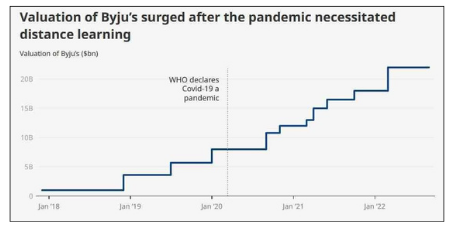
- Costly marketing:
- Aggressively marketing its courses with celebrity endorsements from Shah Rukh Khan and Lionel Messi.
- According to media reports, the company had invested $30-40 Mn in the FIFA sponsorship during the FIFA World Cup 2022, while it spent another $55 Mn on the BCCI sponsorship.
- The company spent Rs 2,250.94 crore on promotional activities in FY21 against Rs 899.34 crore in FY20 while the combined marketing expenditure of Unacademy, Vedantu, and upGrad stood at INR 793.5 Cr in FY21.
- Chronic selling of courses:
- Using all means including pursue,bullying to convince parents to buy courses.
- Unethical work culture:
- Sales people faced verbal abuse, extreme working hours, and intense pressure to meet targets.
- Financial mismanagement:
- Deloitte Haskins and Sells resigned as Byju‟s auditor due to delay in submitting financial statements .
- ED had sent a show cause notice to edtech company's parent entity Think and Learn Private Limited and founder Byju Raveendran, in the FEMA violation case.
- Allegations of breaching privacy:
- Byju‟s faced allegations of mishandling sensitive users‟ information, breaching privacy regulations and engaging in aggressive data mining practices
- Legal cases:
- Around 3,759 complaints were raised against Byju‟s – with 1,397 resolved and 2,362 unresolved cases. These grievances include cancellation delays, issues with obtaining refunds and aggressive marketing tactics.
- Parents fall under debt trap:
- Ultimately had to close their bank accounts to stop deductions by Byju.Pradip Saha‟s book "The Learning Trap."
(Paytm)
- Paytm acronym for 'pay through mobile' has become a household name in India, especially after demonetization.
- Vijay Shekhar Sharma is the founder and CEO of Paytm.He was ranked as India‟s youngest billionaire in 2017 by Forbes when his net worth was calculated at $1.3 billion.
- Post the launch of the Paytm Wallet in 2014, it became one of the most used digital wallets across India
- For the fiscal year 2022–23, Paytm's gross merchandise value (GMV) was reported to be ₹13.2 lakh crore (US$170 billion)
- Overvaluation:The company is overvalued at a Price to Sales (P/S) value of 26 compared to its global peers, who have a P/S of 0.3-0.5
- IPO crash:The stock was issued at Rs2,150, got listed at Rs1,950, hit a high of Rs1,955 and then went into a relentless decline closing at Rs944.50.
- Not a market leader:Paytm is not a market leader in any business it operates in.
- Competition from ever-growing UPI apps- ex Phonepe, Google pay.
- In March 2022, the Reserve Bank of India barred Paytm Payments Bank from signing up new customers after an inspection found that the company was leaking customer data to China-based entities which indirectly owned a stake in Paytm Payments Bank.
- Recently in January 2024, the Reserve Bank of India (RBI) imposed restrictions on Paytm Payments Bank, citing "breach of and compliance with regulatory norms." This meant no more new deposits, credit transactions, or popular wallet services like Paytm UPI after February 29, 2024.
- As per latest update One97 Communication Ltd, which owns the Paytm brand, is likely to resume lending platform provider operations for digital loans by its partner banks and non-banking financial companies (NBFCs) in the first week of March. Paytm's lending platform provider business is not linked to Paytm Payments Bank Limited‟s (PPBL) operations.
(Micromax)
Incorporated as Micromax Informatics Ltd. on 29 March 2000. It started selling mobile telephones in 2008, focusing on low pricing to compete with international brands. Micromax was founded by Mr. Rahul Sharma.
Growth of micromax:- A large part of Micromax‟s growth is attributable to its significant share of the Smartphone market, including so-called phablets.
- As a result, the company has been able to attract a number of first-time Smartphone buyers, who were upgrading from a regular features phone and did not want to spend heavily while doing so.
- It has been able to deliver smartphones with specifications akin to those offered by global handset makers like Samsung, but at half the price.
- As per data from International Data Corp Micromax had a 22% share of the Indian mobile handset market, second only to Samsung, which had a 26% share, and much ahead of other foreign competitors like Nokia, Sony and BlackBerry.
- In 2015, it launched more than 40 new models
- Chinese market dominance:
- The Phones that were branded Micromax were manufactured by Chinese companies like Oppo, Gionee, Vivo, and Xiaomi. Chinese companies had realized the potential of a huge customer base in the Indian markets.
- The Chinese companies were experts in both hardware and software, whatever micromax currently offered they too did but with better quality and at.cheaper rates.
- Chinese phone makers including Xiaomi and Lenovo have also partnered with e-commerce companies including Amazon India and Flipkart to sell phones directly to consumers, saving on distribution and sales and reaching new online shoppers directly.
- Conflict with Alibaba:
- Micromax decided to raise funds from Chinese giant Alibaba. Alibaba withdrew from a proposed $1.2 billion acquisition of a 20% share due to unclear growth objectives.
- Launch of 4G by Jio:
- Most of the phones manufactured by Micromax were 3G enabled.
- In 2016, Reliance Jio launched 4G at much cheaper rates compared to its competitors.
- This triggered the Indian mass to enjoy the faster speed at a limited pocket pinch. Since Micromax could not satisfy the demand of the sudden 4G enthusiasts, it lagged behind, giving way to its Chinese competitors like Xiaomi and Oppo.
Some successful Indian startups:
(CRED)
CRED is a platform founded in 2018 where you can pay your credit card bills and get rewarded for it. CRED is the youngest Indian startup to be valued at around $2.2 billion. This 2-year-old startup has more than 6 million customers and about 22% of all credit card holders.
(PharmEasy)
PharmEasy is an online pharmacy and medical store in India which specializes in OTC products, diagnostic tests, and medical instruments. The company was founded in 2015.This health tech startup has raised a massive $350 million, becoming the first Epharmacy unicorn in India.
(Zerodha)
Zerodha is a financial service company that is registered with the Securities & Exchange Board of India (SEBI) and a member of NSE, BSE and MCXSX, built to provide brokerage facilities to the stock market traders. It was founded in 2010 by Nithin Kamanth. In FY22, the startup reported ₹4,964 crore in revenue and ₹2,094 crore in profits. And they achieved all this without VC funding and advertising. It has valuation of around $3.6 billion.
Global case study of Startup success.
(ByteDance)
ByteDance is a Chinese startup founded in 2012 by Zhang Yiming and Liang Rudo. It is currently the most valued startup of the world at 180 billion dollars.
Most users know the company only by its hit short-video app TikTok, which has been downloaded over 3 billion times globally In 2021, with 1.9 billion monthly active users in 150 countries, and an employee base of over 110,000, the company recorded an astonishing $58 billion in revenues.
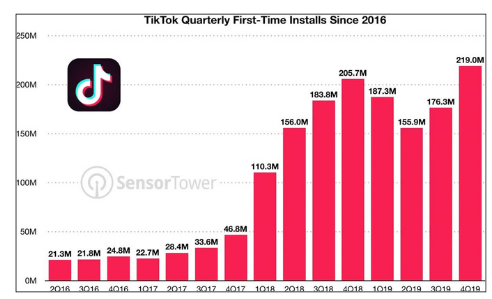
Factors for success of ByteDance:
- Shared Service Platform (SSP):
- This model revolutionizes conventional approaches by centralizing and specializing business functions into focused units.
- The company‟s product teams or units don‟t control their own operating resources.
- The teams are highly specialized, so that the right people can be found and flexibly deployed as needed to each new venture.
- Broad exploration:
- Since its earliest days, ByteDance has searched broadly for new product opportunities.
- It had launched 12 entertainment content apps in its first few months as a company, and 20 apps to test foreign-market opportunities in 2015.
- Rapid iteration:
- ByteDance is also renowned for its speed of development and getting products to market
- It only took the company four months to launch an education app that might have taken competitors 18 months to launch.
- Selective focus:
- The company allocates key resources to a few select priorities for a few years at a time.
- Its first three years were dominated by text- and photo-content experiments relating to the success of Toutiao, while 2016 marked a pivot to short video.
- After three years of experimentation, ByteDance made growing its education business a priority.
- Explicitly flattened hierarchy:
- To induce collaboration and sharing, ByteDance uses a 360-degree performance-evaluation system.
- It has abolished the use of titles and deliberately flattened its hierarchy to just a few layers, so that employees can focus on their responsibilities instead of worrying about status.
- Data-driven culture:
- ByteDance‟s founder, Zhang Yiming, believes that the company‟s most fundamental competitive advantage is its data-driven organizational culture.
- Carefully planned marketing based on data-driven insights has also helped TikTok grow steadily from its teen-dancing user base to the much broader audience it enjoys today.
Global case study of Startup failure
(Theranos Inc)

- Theranos was an American privately held corporation which was founded in 2003 by then 19-year-old Elizabeth Holmes.
- The company claimed that it had devised blood tests that required very small amounts of blood and can be performed rapidly and accurately, using compact automated devices that the company had developed.
- Theranos raised more than US$700 million from venture capitalists and private investors, resulting in a $10 billion valuation at its peak in 2013 and 2014.
- In 2015 Capital BlueCross, a Pennsylvania insurer with 725,000 customers, chose Theranos as its preferred lab work provider.
- In 2015 a medical research professor along with an investigative journalist of Wall Street Journal questioned the validity of Theranos's technology.
- In 2016 The Centers for Medicare & Medicaid Services (CMS) released its report on Theranos' California-based lab.
- Following the CMS report, Walgreens Boots Alliance Inc. (WBA) decided to temporarily close the Theranos Wellness Center in its Palo Alto store and suspend its use of Theranos's Newark, Calif. lab.
- The company faced a string of legal and commercial challenges from medical authorities, investors, the U.S. Securities and Exchange Commission (SEC), the Centers for Medicare and Medicaid Services (CMS), state attorneys general, former business partners, and patients.
- By June 2016, Forbes estimated that Holmes's personal net worth had dropped from $4.5 billion to nothing.
- Theranos, Holmes and former company president Sunny Balwani were charged with fraud by the SEC in 2018 and were later sentenced to imprisonment.
Some UPSC Prelims Previous Years Questions:
Q1. Consider the following statements with reference to India:(2023)
1. According to the 'Micro, Small and Medium Enterprises Development (MSMED) Act, 2006', the 'medium enterprises' are those with investments in plant and machinery between ₹ 15 crore and ₹ 25 crore.
2. All bank loans to the Micro, Small and Medium Enterprises qualify under the priority sector.
Which of the statements given above is/are correct?
(a) 1 only
(b) 2 only
(c) Both 1 and 2
(d) Neither 1 nor 2
Q2. With reference to foreign-owned e-commerce firms operating in India, which of the following statements is/are correct?
1. They can sell their own goods in addition to offering their platforms as market-places.
2. The degree to which they can own big sellers on their platforms is limited.
Select the correct answer using the code given below:
(a) 1 only
(b) 2 only
(c) Both 1 and 2
(d) Neither 1 nor 2
Some Previous Years Mains Questions
Q1. Faster economic growth requires increased share of the manufacturing sector in GDP, particularly of MSMEs. Comment on the present policies of the Government in this regard.(2023)
Q2. “Success of „Make in India‟ programme depends on the success of „Skill India‟ programme and radical labor reforms.” Discuss with logical arguments.(2015)
Q3. While we found India‟s demographic dividend, we ignore the dropping rates of employability. What are we missing while doing so? Where will the jobs that India desperately needs come from? Explain.(2014)
Q4. With a consideration towards the strategy of inclusive growth, the new companies bill, 2013 has indirectly made CSR a mandatory obligation. Discuss the challenges expected in its implementation in earnest. Also discuss other provisions in the bill and their implications.(2013)
Some Questions from This Year's Interview Transcripts
Board Dinesh Dasa sir
- Startups in India
- Name two recently failed big startup‟s
- What Paytm has done ? Why is the RBI regulating it?
- Startups and effect on economy
Board Lt. Gen. Raj Shukla sir:
- Discussion about unemployment and how can we generate more jobs?
- Role of startups in new India?
Board Suman Sharma mam:
- Have you ever thought about a startup or anything related during your engineering times?
- What were the problems( He emphasized on research and training part
Board BB Siwan sir:
- What is a unicorn and what is a decacorn?
- What are the unicorns in India?
- Recently a unicorn is facing a crisis. What are the reasons and what all things other startups can learn from it?
- Consider me as an investor and pitch me a startup idea in the "Travel Vlog" domain.
- If you are integrating AI in the start up, what are its potential?
- Difference between startup and MSME. And similarly?
- Is startup and MSME and vice versa?
Board RN Choubey sir:
- Why Bengaluru has more startups compared to other cities?
- Venture capitalists and Angel investors can invest anywhere but why do they prefer startups based in Bangalore?
- Are you aware of any policies by the local government of Karnataka regarding startups?
- Why is there a wage gap between male and female employees in the IT sector?